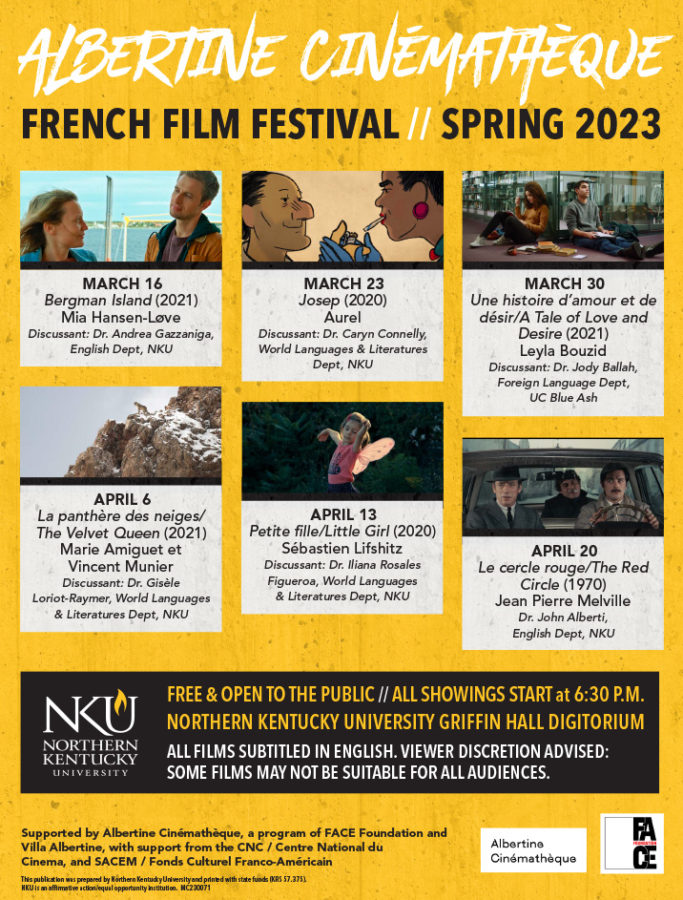French film festival returns to NKU
March 17, 2023
The Griffin Hall Digitorum will transform into a movie theatre on Thursday evenings over the next few weeks as the Albertine Cinémathèque Film Festival comes to campus.
Albertine Cinémathèque Film Festival is a program by the French-American Culture Exchange designed to spread the beloved French art form around the country. Colleges and universities apply for a grant to show a collection of films from a curated list on their campus.
NKU held a previous version of the film festival—Tournées Film Festival—from 2011-2015, according to Dr. John Alberti, English department chair and an organizer of the festival. The festival was moved to University of Cincinnati Blue Ash for a number of years and then disrupted around 2020 while the COVID-19 pandemic surged.
Albertine Cinémathèque Film Festival aims to foster accessibility and appreciation for French film—cinema is central to French culture. France is the self-proclaimed birthplace of film with a rich filmmaking history and culture that distinguishes the media for its artistic value, dating back to niche art houses and the avant-garde French New Wave movement. Their government even encourages the art form and industry through subsidies and international outreach programs like this one.
Given France’s colonial history and international presence plus the global influence of cinema, it is no surprise that cross-cultural perspectives and issues imbue its film culture, which Alberti said will be evident in the festival’s film lineup.
The movie shown on Thursday—“Bergman Island,” directed by Mia Hansen-Love—is a romantic drama that tracks a German and British filmmaking couple during a summer retreat on a Swedish island to work on film scripts. During their stay, the strength of the marriage is tested, revealing weaknesses that throw the relationship into uncertainty—a recognizable character dynamic for an audience accustomed to American film that is executed with multinational influence cinematically and linguistically.
“It’s always a fun thing to look for in international films—how these different pieces move back and forth—in addition to sort of seeing what’s distinctive about international film cultures,” Alberti said.
Five contemporary French films and one classic make up the festival’s batch of movies. A group of faculty collaborated to select the films from a list provided by the French-American Culture Exchange, weighing what would appeal to a college audience and illustrate the diversity and heritage of French film culture, Alberti said.
Along with a few feature-length films, there will be an animated movie and a couple documentaries, spanning topics like natural wonders, transgender identity, wartime displacement, enterprising criminals and romance.
The engrossing nature of film often feels like a window into an unseen world. Alberti feels that watching a foreign film is like a journey to a new place and immersion into a new culture, offering tastes of unfamiliar social norms, interactions and setting akin to temporary and budget-friendly travel.
“That perspective is a really important one and a really liberating one. To realize that there’s a lot of different ways of doing things. Well, the great thing about art is it allows you to have some of that experience of getting these different perspectives without having to get on an airplane and pay a lot of money,” Alberti said.
These films are difficult to access outside their originating country and not commonly sought out by American audiences. It’s likely that the festival experience will be a first for many attendees—an exposure to alternative storytelling strategies and formats that can be enlightening to a fresh set of eyes.
“Brief exposure to other ways of doing film, other types of stories being told, is really important,” said Dr. Caryn Connelly, a Spanish professor who teaches in the Cinema Studies Minor program. “You have people who are like, ‘Oh my god, I had no idea that all this stuff was out there. And my mind is open. My eyes are open.’”
Speaking with student Brii Braziel after the inaugural screening of “Bergman Island,” she said that it was her first time watching a French film, describing the romantic drama as “complicated but alluring at the same time,” citing the film’s weaving of two narratives that conflates reality with imagination and kept her in the story.
The film showings are concluded with a group discussion moderated by a faculty member. The discussions are meant to be open-ended and stimulate reflection and interpretation of the movies.
Showings start at 6:30 p.m. on Thursdays through April 20 and are free for students and community members. All films will be subtitled in English. Before showtime, student organizations from the department of World Languages & Literature sell snacks and baked goods. Find the full list of films and trailers by visiting https://inside.nku.edu/artsci/departments/english/french-film-festival.html.

